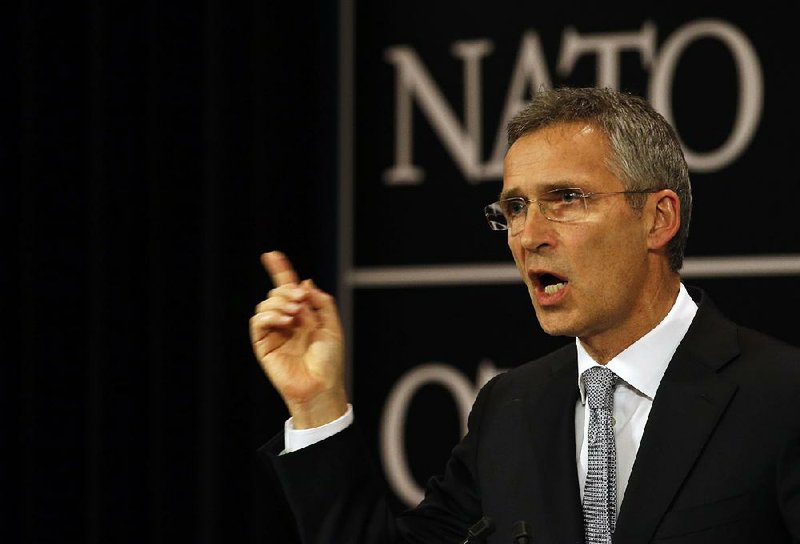BRUSSELS -- NATO remains at loggerheads with Russia over Ukraine but will consider a Kremlin proposal for reducing the risk of air accidents in the crowded skies over the Baltic Sea, NATO's chief said Wednesday.
Alliance Secretary-General Jens Stoltenberg briefed reporters after a meeting of the NATO-Russia Council at NATO headquarters in Brussels. Stoltenberg said NATO ambassadors informed their Russian counterpart, Alexander Grushko, about decisions made at NATO's summit last week in Warsaw, Poland.
On Ukraine, "there was not a meeting of the minds today," Stoltenberg said.
However, he said the Russian delegation made suggestions on risk-reduction moves in Baltic airspace involving the use of warplanes' transponders. The NATO chief said "allies will study this proposal carefully" but want more details.
The 2½-hour meeting at NATO's Brussels headquarters followed last week's gathering of alliance heads of state and government in Poland. Among other things, President Barack Obama and the other NATO leaders ordered reinforcements for allies closest to Russia with four new multinational battalions for Poland and the Baltic states of Lithuania, Latvia and Estonia.
Grushko told reporters that NATO's plans are unjustified because "Russia is not a threat to the alliance." He accused the U.S.-led organization of raising tensions in an area of Europe that has been peaceful until now and added: "Of course, we'll take all necessary measures to protect our security."
Building on an idea first introduced by Finnish President Sauli Niinisto and embraced by Russian President Vladimir Putin, Grushko said he told NATO ambassadors "that our aircraft are ready to fly with their transponders switched on along certain routes. Of course, we count on NATO countries being ready to do the same."
The Russian envoy said the measure also should apply to warplanes from non-NATO countries, like Finland and Sweden, and that Moscow wants military experts from the nations concerned to consult on how to make the plan a reality.
A June report from European Leadership Network, a London think tank, said Russian military aircraft flying without their transponders switched on to alert civilian air traffic controllers to their presence twice forced airliners from SAS, a major Scandinavian carrier, to take evasive action. Russia says U.S. and NATO warplanes pose a similar risk, the network report said.
When it comes to the use of transponders, "different NATO allies have different practices," Stoltenberg said at a news conference. But he said he welcomed the fact Russia "has signaled that it wants to pursue risk-reduction measures."
Dutch NATO Ambassador Marjanne de Kwaasteniet, in a post on Twitter, said Wednesday's session of the NATO-Russia Council, the first in nearly three months, was intended to "keep dialogue with Russia open, despite differences."
In a joint declaration issued in Warsaw, Obama and the other NATO leaders accused Russia of "destabilizing actions and politics," including the 2014 annexation of Crimea from Ukraine and what they called provocative activities near NATO borders, including repeated violations of NATO countries' airspace.
NATO's supreme commander, U.S. Army Gen. Curtis Scaparrotti, told reporters at the summit that he'd like to speak regularly with Russian generals to defuse tensions but hasn't been able to establish contact since he assumed his command in May.
"We've said we're transparent and we're willing to talk, but we've not had that reach-out from them yet," Scaparrotti said.
Russia has expressed anger at plans to post about 4,000 NATO troops in Estonia, Latvia, Lithuania and Poland, saying it creates a security threat on its borders. Those nations fear that they could be next after Russia intervened in Ukraine.
Ahead of the meeting, Russian officials condemned the Western plans to station troops in the Baltics and said that little new dialogue was likely.
"We in Russia are not sure that NATO has any reasons to exist," said Andrey Klimov, deputy head of the Committee on Foreign Affairs of Russia's upper house of parliament, in a telephone interview. He said that the Kremlin was now studying its response to the new NATO battalions, which will be led by the United States, Britain, Germany and Canada.
"Imagine that somebody put some tanks with oil or gasoline near your door. What do you have to do? Do you cry and ask kindly of people not to do that?" he said, suggesting a military buildup on Russian soil was now more likely.
Information for this article was contributed by John-Thor Dahlburg of The Associated Press and by Michael Birnbaum and Andrew Roth of The Washington Post.
A Section on 07/14/2016
